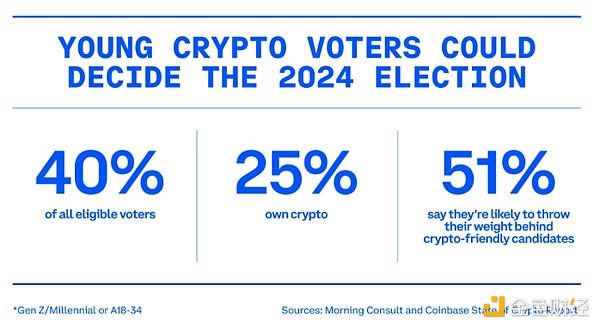Source: Coinbase; Compiled by: Wuzhu, Jinse Finance
summary
Young voters played a decisive role in the 2020 U.S. election, and are expected to be decisive again in 2024. Gen Z and Millennial voters make up 40% of all eligible voters and will form the majority of the electorate by 2028—and they largely represent pro-crypto, pro-innovation voters who want to support candidates who will help improve and update the system. Any candidate who wants to win in 2024, especially those running in battleground states that can make or break federal elections, must take young, pro-crypto voters into account.
Only 9% of Americans say they are satisfied with the current financial system. And among younger Americans[1], only 7% say the financial system is working well for them. Young voters are tired of the outdated system and are looking for change — a belief that is fostering an emerging, pioneering group of pro-crypto voters that has elevated cryptocurrency to a key campaign issue in the 2024 election cycle.
Young voters expected to turn out in large numbers in upcoming US election
Young Americans make up a significant portion of the electorate. Gen Z and Millennial voters make up 40% of all eligible voters, will become the majority of the electorate by 2028, and have a proven track record of influencing elections at all levels of government. In 2020, for example, 55% of eligible voters under the age of 30 made their voices heard at the ballot box, 11 percentage points higher than in 2016. This active constituency is likely to be decisive again in 2024; 92% of registered voters under the age of 35 say they are likely to vote in the November election[2].
Not only is this voting bloc large, but it also has a different worldview than previous generations. Only 19% of millennials and 9% of Gen Z adults believe the American Dream is achievable [3]. They are actively seeking change. And part of that change is cryptocurrency. Younger generations are facing increasing economic pressures and growing disillusioned with the current system, but they are also increasingly empowered by technology and emboldened to take action on their own initiative. As a result, younger generations own cryptocurrency in far greater numbers than older populations—25% of 18-34 year olds own cryptocurrency, compared to 14% of older Americans[4]. As evidenced by the growing number of supporters who have pledged to support cryptocurrency—1.33 million as of this writing—they are looking for candidates who share their passion for innovative solutions to systemic problems. With less than 80 days until the 2024 election, candidates from both parties hoping to win this November must focus on the young, diverse, crypto-friendly base of voters who could make or break their campaigns.

Young voters see cryptocurrency as a top political issue — especially in battleground states
Contrary to popular belief, cryptocurrency is a nonpartisan issue: 41% of cryptocurrency owners under the age of 35 in swing states identify as Democrats, 39% identify as Republicans, and 20% identify as independent or other[5]. Now, young voters’ acceptance of cryptocurrency has helped make cryptocurrency policy a key topic in this year’s campaign. Nearly two-fifths (38%) say cryptocurrency and blockchain can expand economic opportunities for them in a way that traditional finance cannot. Nearly four-in-ten (38%) believe cryptocurrency is the future of finance. Importantly, more than half (51%) are likely to support a crypto-friendly candidate in 2024. Young voters can make a decisive difference for either party—especially in battleground states, where a few votes can mean the difference between a win and a loss.
In Georgia, for example, 51% of eligible voters under the age of 30 voted in 2020, compared to 37% in 2016. This was the largest increase among the Southern demographic and was a major factor in President Biden’s narrow victory in the state in 2020. Since then, cryptocurrency has become an issue of concern, especially among younger voters, with the voting gap among “pro-crypto” supporters in Georgia now three times larger than the one that determined the Biden-Trump outcome in 2020. With Georgia expected to be one of the most competitive states in the country again this year, turnout among young crypto-supporting voters will have a measurable impact on who wins the state.
Other battleground states followed the same pattern. Arizona saw a larger surge in young voters in 2020 than the nation as a whole, compared to 2016. We know that surges are accompanied by calls for change; among Arizona’s cryptocurrency holders under 44, 88% of past and current holders believe the financial system needs to change, and 27% want the system overhauled[5]. In Michigan, youth turnout jumped to 54% in 2020 from 42% in 2016, helping President Biden pull off another narrow victory in one of the most important Electoral College states.
The future of the financial system will be decided on the ballot this November
As a new generation of voters emerges, digital asset innovation has also become a new focus. A poll released in May showed that more than 20% of voters in several battleground states believe that cryptocurrency is a key issue in the upcoming US election. When you narrow the scope to the latest generation of voters, 90% of former and current cryptocurrency holders in five key swing states believe that the financial system needs to change[5], and 61% of former and current cryptocurrency holders under the age of 35 in five key swing states said they are keen to vote for a candidate who supports the cryptocurrency industry this year [5]. In these states, young cryptocurrency holders are tired of the rising costs and high fees of traditional financial services and believe that cryptocurrency and blockchain can help solve these problems.
As 2024 candidates make their final push before Election Day, these points of evidence should serve as a clear call to action: Young, pro-crypto voters will make their voices heard at the ballot box this year. Politicians who want to get votes must address the future they want. That future is financial and economic freedom. And cryptocurrency will be the path to that future.
Notes:
[1] For the purposes of this blog post, “young Americans” and “young voters” refer to those aged 18-40, unless otherwise noted.
[2] Source: Registered Voter Study, Impact Research commissioned by Coinbase Inc., June 2024.
[3] Source: Generational Research, Bovitz, Inc., commissioned by Coinbase Inc., July 2023.
[4] Source: Morning Consult, April 2024.
[5] Source: Swing State Research, Impact Research commissioned by Coinbase Inc., July 2024.







